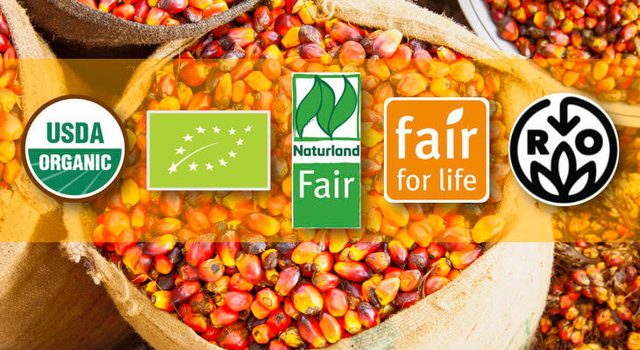Like all other Serendi companies, Serendipalm is certified to organic and fair trade standards. This combination of consumer-facing standards lends Dr. Bronner’s corporate philosophy verifiable credibility and helps its raw materials suppliers assess their strengths and weaknesses. Serendipalm’s supplying farms and its production facility have been certified fair trade since 2008 to the “Fair for Life” standard and are certified organic in accordance with the EU Organic Regulation (EC) No. 834/2007, the National Organic Program (NOP) of the U.S. Department of Agriculture (USDA) and the Naturland organic standard. The reputable Swiss certifier IMO and its parent company Ecocert conduct annual on-site inspections to ensure Serendipalm’s continued compliance with these standards.
Organic (EU, NOP, Naturland)
Organic rules define ecological agriculture and the processing of agricultural products in a nature-friendly way. The underlying principle is the creation of a preferably closed production cycle. Ecological agriculture dispenses almost entirely with the use of agrochemicals—i.e. synthetic pesticides and mineral fertilizers—as well as genetic technology, methods that are commonly used in “conventional” agriculture.
For us, organic means far more than “no spraying” and merely complying with regulations. Rather, we help farmers understand organic farming as a production philosophy and train them in sustainable production methods. Soil fertility, biodiversity, and species protection have priority and go hand in hand with increasing yields for farmers.
Fair for Life
The “Fair for Life” seal identifies products made from socially responsible and environmentally friendly cultivation that have also been processed and traded on fair terms.
The FFL certification program was developed by the Swiss Organic Foundation in conjunction with the Institute for Market ecology (IMO) as an alternative fair trade certification program. It sets criteria for fair conditions for all producers and products along the entire value chain of a product, not only its agricultural portion.
As do other fair trade certification programs, Fair for Life stipulates prices to farmers that guarantee a profit. If market prices fall to below that level, a floor price is triggered. More commonly, Serendipalm buys at market prices, pays by actual weight—not estimated weight as is common, to the disadvantage of farmers—and adds an organic premium. Payment is by bank transfer within 2 days. In addition, Serendipalm’s customers pay a fair trade premium used to finance community development projects. Unlike other certification schemes, FFL demands safe and socially responsible working conditions along the entire supply chain, not just in the field but also in processing operations, such as Serendipalm’s oil mill and at Dr. Bronner’s headquarters in California. Finally, FFL expanded the traditional realm of fair trade to include goods produced in developed countries. In a globalized trading world, producers, processing facilities, trading businesses, and brand companies jointly share responsibility. Alongside social and fair trade criteria, “Fair for Life” also specifies other environmental criteria that are not yet required for organic certification www.fairforlife.org. The Naturland Fair Certification largely follows the same philosophy and uses the same criteria as the Fair for Life standard.
Regenerative Organic Certification
Serendipalm is Regenerative Organic Certified (ROC). ROC was established in 2017 by a group of farmers, business leaders, experts in soil health, animal welfare, and fair trade, collectively called the Regenerative Organic Alliance (ROA).
ROC was created to combine existing high-bar certifications to design a holistic certification framework for people and planet. Notably, its soil health requirements go beyond those by US and EU organic requirements. With USDA Organic certification as a baseline, Regenerative Organic Certification recognizes the work already conducted by animal welfare and fair trade standard bodies, and therefore, leverages this work as part of the journey to Regenerative Organic Certification.
Serendipalm was one of 19 companies to participate in the ROC pilot program and achieved, in 2020, “Silver” level ROC certification for its main raw materials, i.e. palm oil and cocoa. We are currently developing regenerative organic cassava, turmeric, ginger and plantain supply chains. This involves the planting of multi-strata dynamic agroforestry systems to diversify farmer income and buffer against climate change. More about ROC here!
